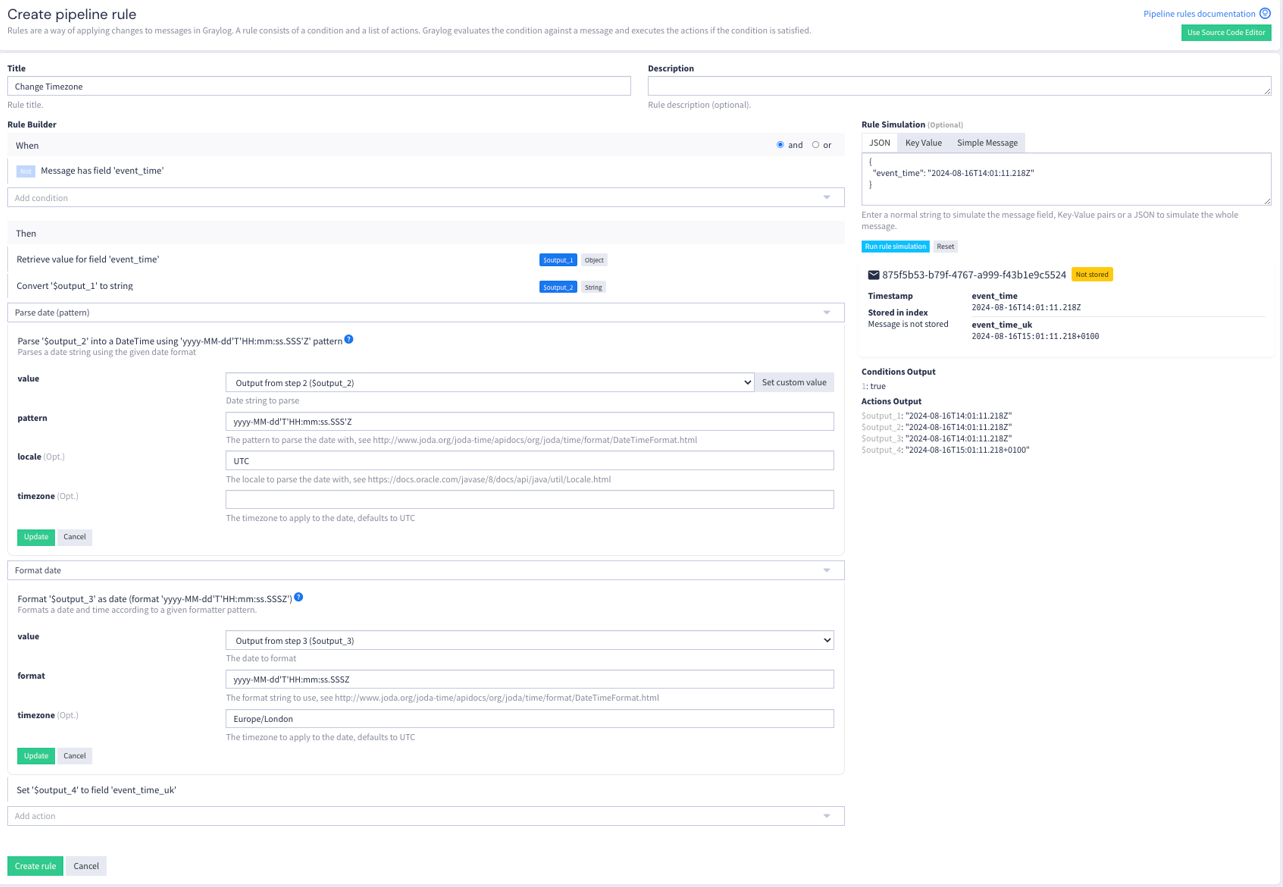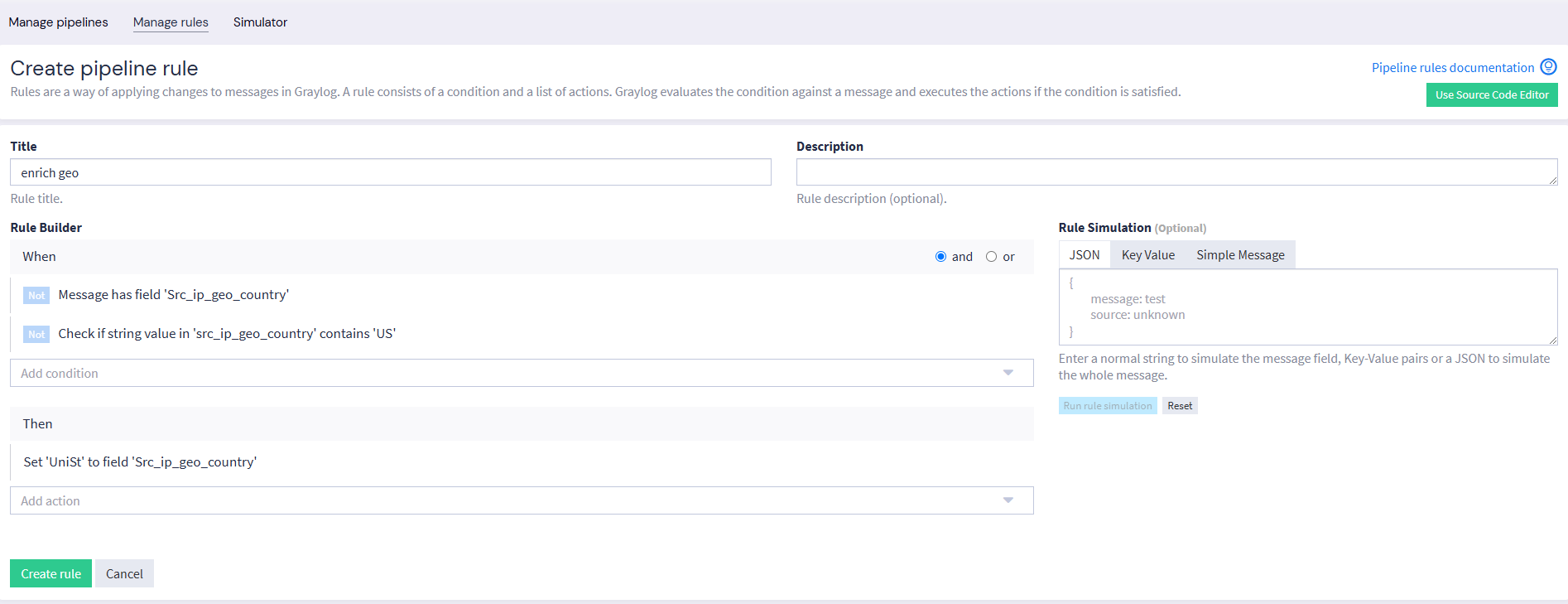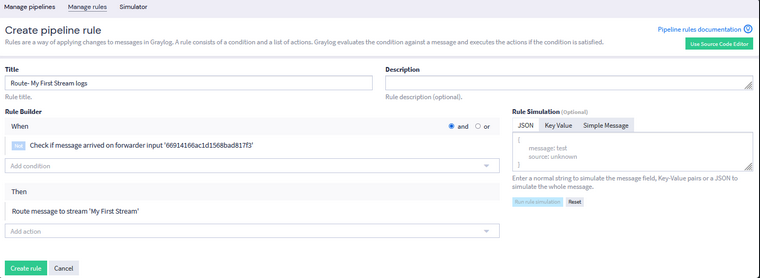Rule Builder Use Cases
Graylog's rule builder interface is a powerful tool designed to simplify the process of creating, managing, and applying rules for processing log messages. As organizations collect large volumes of data from various sources, the ability to efficiently parse, filter, and route this data becomes crucial for effective log management and real-time insights. The rule builder serves as an intuitive, visual way to construct these rules without needing to write complex code.
This article covers practical use cases for pipeline rules, including filtering logs, data enrichment, and routing messages to streams and alerting systems. We encourage you to use these scenarios as a reference to build efficient pipeline rules of your own.
Anonymization Rules
Pipeline rules can be used to modify or redact parts of log messages that contain sensitive data. This data can be modified before messages are stored or forwarded. Anonymization helps ensure compliance with privacy regulations by masking sensitive information in log messages.
Example Rule

In this rule, the following logic is applied:
-
When (condition)
-
The rule checks if the field
source_ipexists in the log message. This ensures the rule is applied only to messages that actually contain thesource_ipfield.
-
-
Then (action)
-
If the condition is true (i.e. the
source_ipfield exists), the rule removes thesource_ipfield from the message. This action effectively deletes the field and ensures that the sensitive data (e.g. an IP address) is no longer part of the log message.
-
Example Rule Syntax
rule "Mask sensitive information."
when
has_field("source_ip")
then
remove_single_field("source_ip");
endBreadcrumb Rules
A breadcrumb rule helps to track or trace the flow of log messages through different stages or systems, serving as a breadcrumb that can be followed or traced. These rules could be used to add metadata, tag messages, or track processing.
Example Rule

In this rule, the following logic is applied:
-
When (condition)
-
Because the when statement is
trueby default, this rule will always execute for every log message processed by the pipeline regardless of the message's content.
-
-
Then (action)
-
The
set_fieldfunction creates or updates a field namedrule_demoin the log message. The field is set to the value"Every cloud has a silver lining.", meaning each message that passes through this pipeline will have a new field namedrule_demoadded with the value"Every cloud has a silver lining.".
-
Example Rule Syntax
rule "Set demo field"
when
true
then
set_field("rule_demo", "Every cloud has a silver lining.");
endFilter Rules
Filter rules can be used to drop messages and reduce unnecessary ingestion and license usage.
Example Rule

In this rule, the following logic is applied:
-
When (condition)
-
The condition checks whether the log message contains a field named
testing_only. If the field exists in the log message, the condition evaluates totrue.
-
-
Then (action)
-
If the condition is
true, the message is dropped via thedrop_message()function. This action removes the log message entirely, preventing it from being stored, processed further, or routed to any streams.
-
Example Rule Syntax
rule "Drop Test Messages"
when
has_field("testing_only")
then
drop_message();
End
Modification Rules
Modification rules are rules applied to log messages to alter or enrich them by adding, updating, or removing fields; changing values; or performing other transformations.
Example Rule

In this rule, the following logic is applied:
-
When (condition)
-
The rule checks if the log message contains a field named
event_time. If the field exists, the rule proceeds to process the message.
-
-
Then (action)
-
The rule takes the value of the
event_timefield (converted to a string) and parses it into a date object using the provided format and the timezone UTC. -
It then takes the parsed date object (
event_time_date) and formats it into a string using the UK timezone. -
Finally, it adds the new field
event_time_ukto the log message with the converted time value.
-
Example Rule Syntax
rule "convert event_time to UK timezone"
when
has_field("event_time")
then
let event_time_date = parse_date(
value: to_string($message.event_time),
pattern: "yyyy-MM-dd'T'HH:mm:ss.SSS'Z'", // Adjust this pattern as needed
timezone: "UTC"
);
let event_time_uk = format_date(
value: event_time_date,
date_format: "yyyy-MM-dd'T'HH:mm:ss.SSSZ",
timezone: "Europe/London"
);
set_field("event_time_uk", event_time_uk
);
end
Enrichment Rules
Enrichment rules are used to enhance log messages by adding additional information or context to them.
Example Rule

In this rule, the following logic is applied:
-
When (condition)
-
The rule checks if the field
Src_ip_geo_countryexists in the message and has the value of"US".
-
-
Then (action)
-
The action updates the value of the field
Src_ip_geo_countryto"UniSt".
-
Example Rule Syntax
rule "SrcCountryUnitedStates"
when
(has_field("Src_ip_geo_country") &&
to_string($message."Src_ip_geo_country") == "US"
)
then
set_field(
field : "Src_ip_geo_country",
value : "UniSt",
clean_field : false
);
endRouting Rules
Routing rules allow you to route certain messages to a stream and remove them from the current stream.
Example Rule

In this rule, the following logic is applied:
-
When (condition)
-
The rule applies to messages that have a field named
gl2_remote_ip, and the value of thegl2_remote_ipfield must match the string"66914166ac1d1568bad817f3".
-
-
Then (action)
-
The message is routed to the stream named
"My First Stream".
-
Example Rule Syntax
rule "Route Message to Stream"
when
has_field("gl2_remote_ip") && to_string($message.gl2_remote_ip) == "66914166ac1d1568bad817f3"
then
route_to_stream(
name: "My First Stream",
remove_from_default: true
);
end
